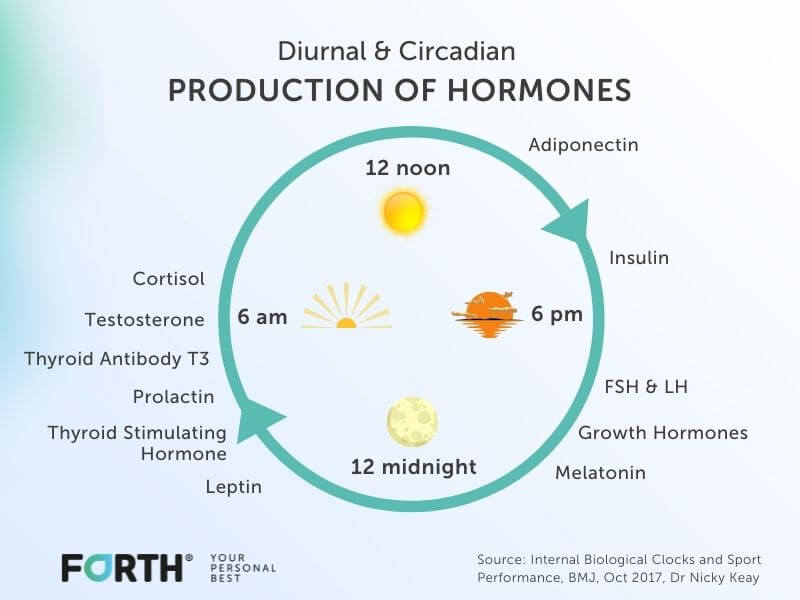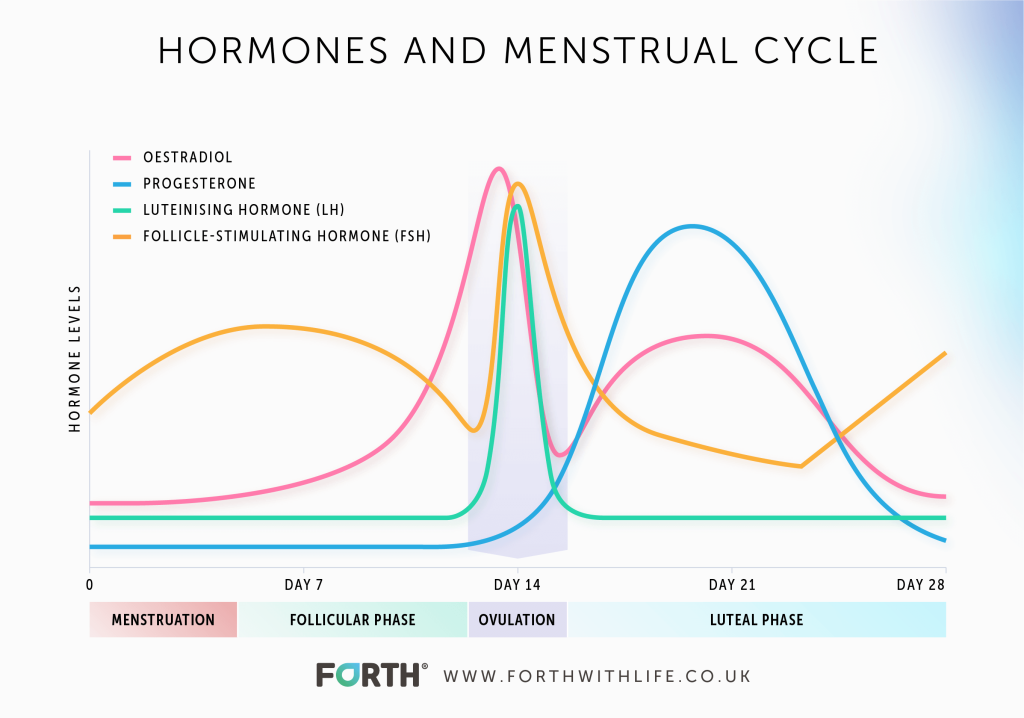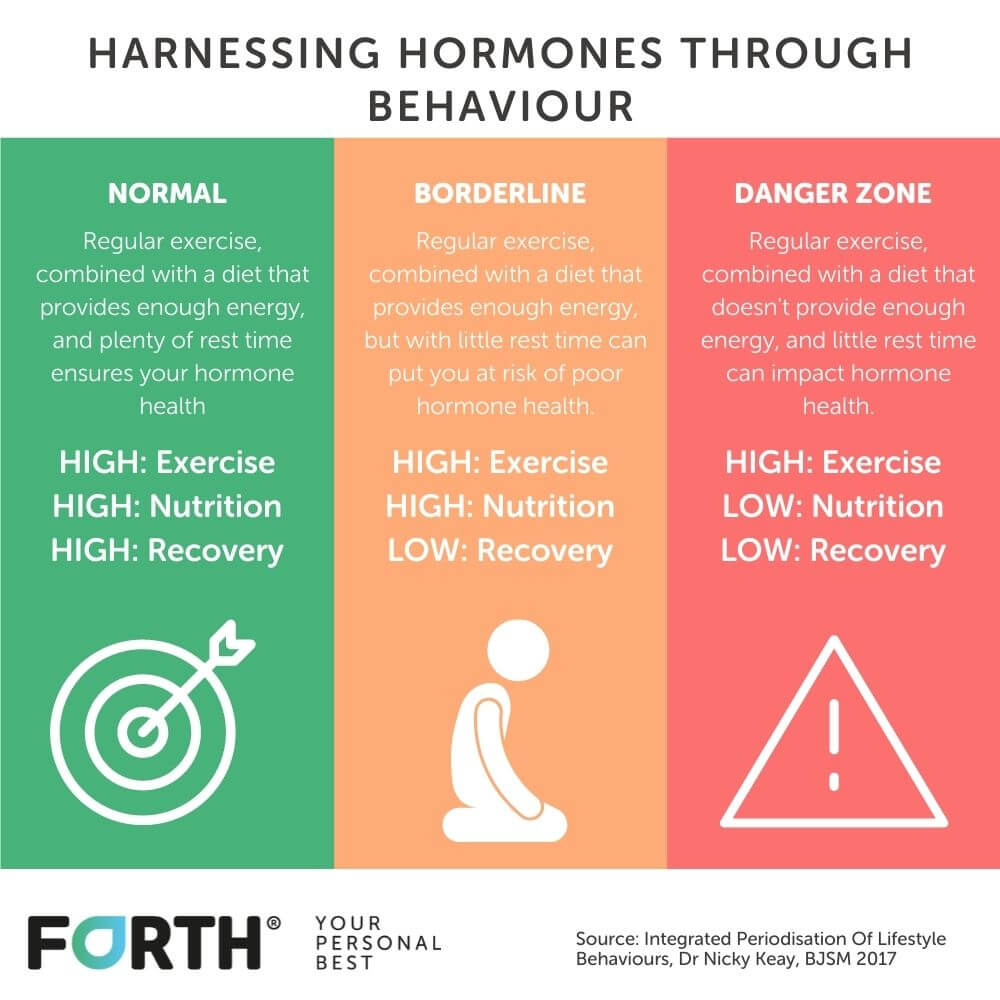7 mins read
How Are Hormones Tuned Into Our Biological Clocks?

What Is The Biological Clock?
The body runs a variety of biological processes, each according to its particular internal biological clock. These are known as biochronometers [1].
The body has 4 biochronometers, the most well-known is the circadian rhythm which oversees our wake/sleep pattern:
- The diurnal cycle is based on every 24 hours as a result of the full rotation of the Earth.
- The circadian rhythm is based roughly on every 24-25 hours depending on light/dark cycles, so can vary slightly according to the season.
- The infradian cycle runs over more than a day, for example, the lunar month of the menstrual cycle.
- And lifespan time is the longest in chronobiology.
Our hormones and endocrine system are finely tuned to these biochronometers and any disruption in these cycles can have an impact on our health.
Diurnal Cycle
The diurnal cycle influences the variation in hormone release over a 24-hour period. This is particularly true of the hormone cortisol. Hormone release is orchestrated by the hypothalamus in the brain which acts as a gatekeeper and controls the diurnal variation of cortisol released by the adrenal gland. Hence, cortisol levels being highest first thing in the morning shortly after waking, and gradually decline throughout the day.
Circadian Rhythm
The circadian rhythm controls our sleep/wake cycle with melatonin being released to relax the body and prepare us for sleep. Melatonin release is triggered by darkness and inhibited by light, which is why too much screen time before bed can prevent the onset of sleep.
The circadian rhythm can be altered depending on when you go to bed and get up. This is why people are advised to go to sleep and get up at the same time every day to help improve sleep quality. It’s also why people with changing shift patterns are more likely to suffer poor quality sleep as it disrupts the circadian rhythm.
There are other hormones in the body that work to the circadian rhythm, which is important because sleep plays a key role in stimulating the release of some key hormones. So, ensuring you get a good night’s right is important for hormone health. We talk about this in more detail below.
Learn more about ‘How Sleep Is Important For Our Health’.

Infradian Rhythm
The menstrual cycle is in tune with the infradian rhythm as it runs over the course of a lunar month.
The menstrual cycle consists of a finely tuned hormone network made up of the two control hormones (FSH and LH) and the ovarian response hormones (oestrogen and progesterone). These four female hormones work together in a complex and intricate pattern during the menstrual cycle.

These natural variations in hormones play a key role in women’s overall wellbeing with each phase of the menstrual cycle having an impact on how a woman may feel, impacting energy levels, mood, sleep and appetite.
Learn more in our blog ‘Menstrual Cycle: Tune Into Your Hormones’.

Lifespan
Hormones play a huge role throughout our entire lifespan, from the time we’re born, through infancy and childhood and into adulthood and old age.
Children experience a growth spurt due to growth hormones which play a role in the growth and maturation of cells, muscles and bones.
Puberty is when the body releases sex steroid hormones such as oestrogen in women and testosterone in men.
During our adult lives, hormones play a huge role not only in reproduction but in our overall wellbeing. The pressure of adult life can have an impact on our hormone health with increases in stress from work, poor sleep, poor diet and a lack of exercise all having a negative impact on our hormones. This can lead to a hormone imbalance.
Learn more about Hormone Imbalance.
As we get older, particularly women as they transition to menopause, hormone levels will naturally start to change. During perimenopause, women will experience declining oestrogen levels and an increase in FSH and LH. Men will also experience a gradual decline in testosterone.
How To Work With Your Body’s Biochronometers
The lifestyle choices we make play a key role in our hormone health, and therefore, our overall physical and mental health. Tuning into your body’s biochronometers will help keep your hormones in balance.
Over a lifespan, there is evidence that the female hormone system, specifically the menstrual cycles which is on an infradian rhythm, are more susceptible to misalignment than the male hormone system [2]. This is hardly surprising as the female hormone system is the most complex hormone network in the human body.
For both men and women, increasing years will see a natural physiological decline in hormones so this means modifications to lifestyle behaviours, for example, the type and timing of exercise, nutrition, and recovery time to keep in step with changing biochronometers.
By understanding how your biochronometers change as you get older, coupled with declining hormone levels will help you take steps in maintaining longer-term health. For example, the risk of developing osteoporosis – particularly in post-menopause women – increases with age; so too does the loss of muscle mass and strength, a condition known as sarcopenia.
A particularly good starting point for ensuring you get in tune with your internal body clock is to make sure you have a good sleep pattern [3].
Sleep – “Chief nourisher in life’s great feast”
Sleep is the time when key hormones such as Growth Hormone and the control hormones – luteinising hormone (LH) and follicular stimulating hormone (FSH) – are produced. In adults, Growth Hormone plays an important role in maintaining optimal body composition.
The control hormones LH and FSH play a key role in regulating the reproductive system by triggering the release of ovarian response hormones – oestrogen and progesterone. These 4 hormones play an important role in both physical and mental health. A lack of sleep will impact the secretion of these control hormones from the pituitary gland in the brain [4], unbalancing the finely tuned network of all 4 hormones.
The other important point about maintaining a consistent sleep pattern is that it ensures you are keeping in tune with the diurnal rhythm of cortisol released by the body. As mentioned earlier, cortisol is highest in the morning when you wake to give us that ‘get up and go’ feeling and declines throughout the day. A lack of sleep puts stress on the body, add to that a stressful lifestyle and the diurnal variation of cortisol release is disrupted causing consistently high levels throughout the day.
This, in turn, has a knock-on effect on other key hormones networks, causing a hormone imbalance that will have a negative impact on physical and mental health.
Other factors that might cause stress on the body and trigger the release of cortisol is the triad of exerciser, nutrition, and recovery.

Energy deficits from not eating consistently and/or sufficiently, as well as high-intensity exercise and training that is not matched with adequate rest and recovery all put stress on the body. The net effect that is cortisol loses its normal biological fluctuation.
Learn more about Cortisol and Stress.
Sleep Hygiene
Sleep hygiene is a term used to describe the steps you can take during the day and in the evening to ensure a good night’s sleep. These include:
- Keeping to a consistent time of going to bed and getting up, where possible.
- Establish a good wind-down bedtime routine
- Try to avoid looking at electronic devices close to bedtime as this frequency of light disrupts the production of the sleep hormone melatonin
- Avoid things that might act as stimulant such as caffeine drinks
- A milky bedtime drink is a good option as not only does milk contain the protein casein for muscle formation, also the precursor tryptophan to make melatonin
Learn more about Sleep Hygiene.
Summary
Biochronometers are internal biological clocks that run on a variety of timescales. These patterns of timescales are reflected in the release of hormones, which are key players in health. Respecting your internal clocks when considering your lifestyle behaviours will pay dividends for your health and wellbeing throughout your life.
The first step to ensure your lifestyle behaviours are in step with your internal biological clocks is by testing your hormones. Our advanced female hormone blood test, MyFORM™, can map your hormones across your entire menstrual cycle, and provide an in-depth report from our expert endocrinologist. From there you can monitor if modifications in your eating, exercise and sleep behaviours result in improvements in your hormone health.
Article references
This information has been medically written by Dr Thom Phillips
Thom works in NHS general practice and has a decade of experience working in both male and female elite sport. He has a background in exercise physiology and has published research into fatigue biomarkers.

Dr Thom Phillips
Head of Clinical Services
Related articles
Like this article? Here are some more based on similar topics.



